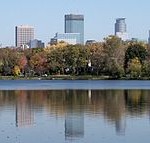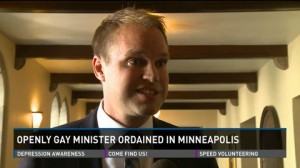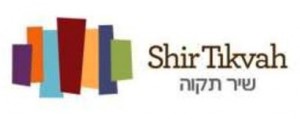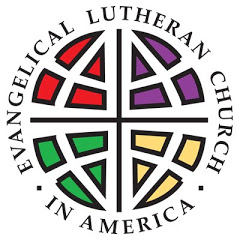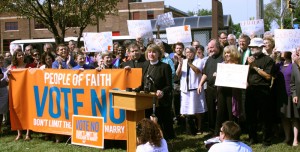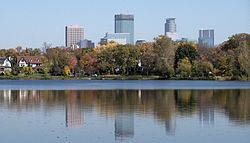
Minneapolis is home to a large number of LGBT-inclusive religious organizations, churches, and history-making people of faith.
(In April, Minneapolis Mayor Betsy Hodges announced that the week of July 14-20 would be the First Best Week of Bragging About Minneapolis Ever, an effort to cast aside our collective aversion to bragging and start telling the world why Minneapolis is one of the best places to be. TheColu.mn is honoring First Best Week of Bragging About Minneapolis Ever with a series about why Minneapolis is a great place for LGBT people.
It’s still not perfect, but Minneapolis has a lot to brag about. This is the third part in a five part series.)
6. For LGBT people of faith, Minneapolis has a long list of places to worship.
Whether you’re Episcopal, Jewish, Catholic, Methodist, Presbyterian, Baptist, Unitarian, Congregational, Lutheran, United Church of Christ, Mennonite, unaffiliated, or none of the above, Minneapolis has a place of worship for you.
Minneapolis is home to All God’s Children Metropolitan Community Church, a part of the historical LGBT churches that sprung up in the 1970s.
Minneapolis also has community groups for LGBT people of faith such as Keshet Ga’avah and J-Pride for LGBT Jews, Dignity Twin Cities for Catholics, Northwoods Radical Faeries for pagans, and Affirmation for LGBT Mormons, among others.
5. Minneapolis has a great community of LGBT and allied non-believers.
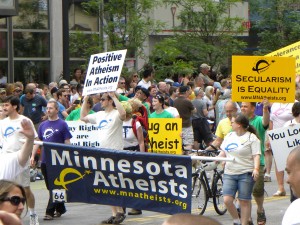
Minnesota Atheists marching in Twin Cities Pride Parade
Atheist and Humanist groups in Minneapolis have been active in the struggle for LGBT equality since the 1980s when groups first started to organize.
Minnesota Atheists has long been a welcoming group for LGBT Minneapolitans. The group backed a marriage equality lawsuit launched in Minneapolis, and testified at the Minnesota Capitol in support of marriage equality in 2013.
The Humanists of Minnesota were strong backers of the push for marriage equality and the defeat of the anti-gay marriage amendment in 2012.
4. Minneapolis has been home to many trailblazing LGBT people of faith.
In the 1980s, Stacy Offner become the first lesbian rabbi in a mainstream Jewish congregation, Shir Tikvah Congregation of Minneapolis.
In 2003, Mary Albing became the first lesbian minister ordained by the Evangelical Lutheran Church in America, when she became pastor of the Lutheran Church of Christ the Redeemer in south Minneapolis. The ELCA refused to accept her ordination until 2009 when the ELCA lifted the ban on non-celibate LGBT clergy.
In 1992, Nadean Bishop became the first lesbian to be ordained in the American Baptist Churches-USA when she was called to University Baptist Church in Dunkytown.
Bishop Eugene Robinson became the first gay bishop in the Episcopal Church after the general convention in Minneapolis approved his appointment in August 2003.
In 2013, Shannon Kearns made history as the first transgender person to be ordained by the North American Old Catholic Church and heads the House of the Transfiguration.
3. Many firsts for LGBT people of faith have occurred in Minneapolis.
In 2009, one of the largest religious denominations in the nation, Evangelical Lutheran Church in America, met in Minneapolis and voted to allow gays and lesbians in committed monogamous relationships to serve as clergy.
In 2011, Twin Cities Presbyterians were the deciding vote to allow openly gay and lesbian clergy.
In 1975, the United Church of Christ held its general synod meeting in Minneapolis and adopted a statement acknowledging the harm religion has inflicted on LGBT people. That statement began the conversation in the UCC which would ultimately make it one of the most affirming denominations in the nation.
2. Many religious organizations working toward LGBT inclusion are based in Minneapolis.
More Light Presbyterians just outside Minneapolis, in Minnetonka. It’s mission is to “work for the full participation of lesbian, gay, bisexual, transgender and queer (LGBTQ) people in the life, ministry and witness of the Presbyterian Church (USA) and in society.”
ReconcilingWorks, which was originally Lutherans Concerned, is based in Minneapolis. The organization works for full inclusion of LGBT people in the Evangelical Lutheran Church in America, the largest Lutheran denomination, and the 7th largest Christian denomination in the United States.
Brethren Mennonite Council for LGBT Interests is based in Minneapolis. The organization cultivates “an inclusive church and society and to care for the Mennonite and Brethren lesbian, gay, bisexual, transgender, and allied community.”
The National Gay and Lesbian Task Force’s Institute for Welcoming Resources is based in Minneapolis. The organization is comprised of most of the LGBT organizations within mainline Christian denominations and provides resources so that “churches become welcoming and affirming of all congregants regardless of sexual orientation and gender identity.”
1. Minneapolis people of faith helped defeat the anti-gay marriage amendment and usher in marriage equality.
120 religious organization signed up to oppose the discriminatory amendment, many of them state or national denominations such as the Episcopal Church of Minnesota, the Minnesota Rabbinical Association, and the United Theological Seminary. Congregations of Lutherans, Jews, Quakers, Mennonites, Unitarians, Methodists, Baptists and many more faith traditions signed on to fight the amendment.
That list included dozens of Minneapolis churches who held get out the vote efforts among their membership.
Clergy United for All Families formed and helped organize faith leaders.
According to MPR, a group of 155 clergy walked down the aisle at Hennepin Avenue United Methodist Church in Minneapolis during “All Saints: A Day for All Families.”
Pastor Kelly Chatman of Redeemer Lutheran Church of Minneapolis explained why she voted no:
“I will be voting no because of my faith, not in spite of my faith. We have many different religions in our country and in our state. We must ensure our religious freedom is preserved.”
When marriage equality become a reality in Minnesota, many Minneapolis churches celebrated and made accommodations for same-sex couples.
